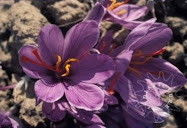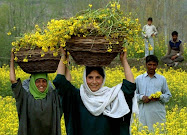
Subsequently a brief pooja of the Vatkanatha is formally conducted every morning and evening and Prasad distributed for two or three days before a formal ceremony preferably on a river bank in the evening as a ceremonial adieu to all the deities with a lighted Diya left floating on the water with loud recitations of sacred hymns. It is just like the immersions of the Durga statues into sacred rivers after Durga pooja in the rest of India especially south. All pooja vessels are thus emptied of the walnuts and the water dropped into the river. The walnuts thus soaked in water for a couple of days are preserved for prasad and sent to all friends and relatives especially to the married daughters and sisters families with some gifts. This exchange of Heyrath prasad with high fervor continues for almost a week and the soaked walnuts are greatly relished for their fresh taste.
There is a tradition of cooking some particular dishes on the occasion in the family for making offerings and taking later as a Prasad. Non-vegetarian dishes were abundantly prepared, offered in the pooja and eaten as Prasad till recently but have now been discontinued as an honour to the sentiment of Hindus of the plains for the festival. Among the vegetarian dishes cooking of Lotus stem (Nadru) is a must besides other preferred preparations. The cooking of fish has been a specialty with KPs on this day and continues as such even now in most KP homes on the following day of Hayrath (Salam) if not on the Hayrath eve.
The following day is called Salam in Kashmiri. It’s the day of celebration, joy, visiting friends and relatives, sharing joys and sorrows and above all extensive eating of all preferred vegetarian and non-veg dishes. The main event in the morning is giving away cash gifts from elders to youngsters called Hayrath-Kharech. The children have a long wait for the day as they receive enough free to spend money from their elders on this day. In Kashmir the Muslim neighbours and friends also joined our celebrations with due fervor by meeting, extending Heyrath greetings and partaking choicest food preparations especially fish, the famous recipe of KPs.... (to be continued)
There is a tradition of cooking some particular dishes on the occasion in the family for making offerings and taking later as a Prasad. Non-vegetarian dishes were abundantly prepared, offered in the pooja and eaten as Prasad till recently but have now been discontinued as an honour to the sentiment of Hindus of the plains for the festival. Among the vegetarian dishes cooking of Lotus stem (Nadru) is a must besides other preferred preparations. The cooking of fish has been a specialty with KPs on this day and continues as such even now in most KP homes on the following day of Hayrath (Salam) if not on the Hayrath eve.
The following day is called Salam in Kashmiri. It’s the day of celebration, joy, visiting friends and relatives, sharing joys and sorrows and above all extensive eating of all preferred vegetarian and non-veg dishes. The main event in the morning is giving away cash gifts from elders to youngsters called Hayrath-Kharech. The children have a long wait for the day as they receive enough free to spend money from their elders on this day. In Kashmir the Muslim neighbours and friends also joined our celebrations with due fervor by meeting, extending Heyrath greetings and partaking choicest food preparations especially fish, the famous recipe of KPs.... (to be continued)
.jpg)




I believe you were so right that KPs have such a unique and rich culture.I have neither read nor witnessed such a ceremony.I was wondering the women of the household must be really tired after the entire ceremony seeing the number of dishes which are a part of this celebration.....just kidding.
ReplyDeleteThere is no question of fatigue or tiredness when the work is done with dedication and love. Keeping in view the sanctity of the festival everything hectic turns into pleasure and especially rewarding as whatever is wished for after the pooja is undoubtedly fulfilled.
ReplyDelete